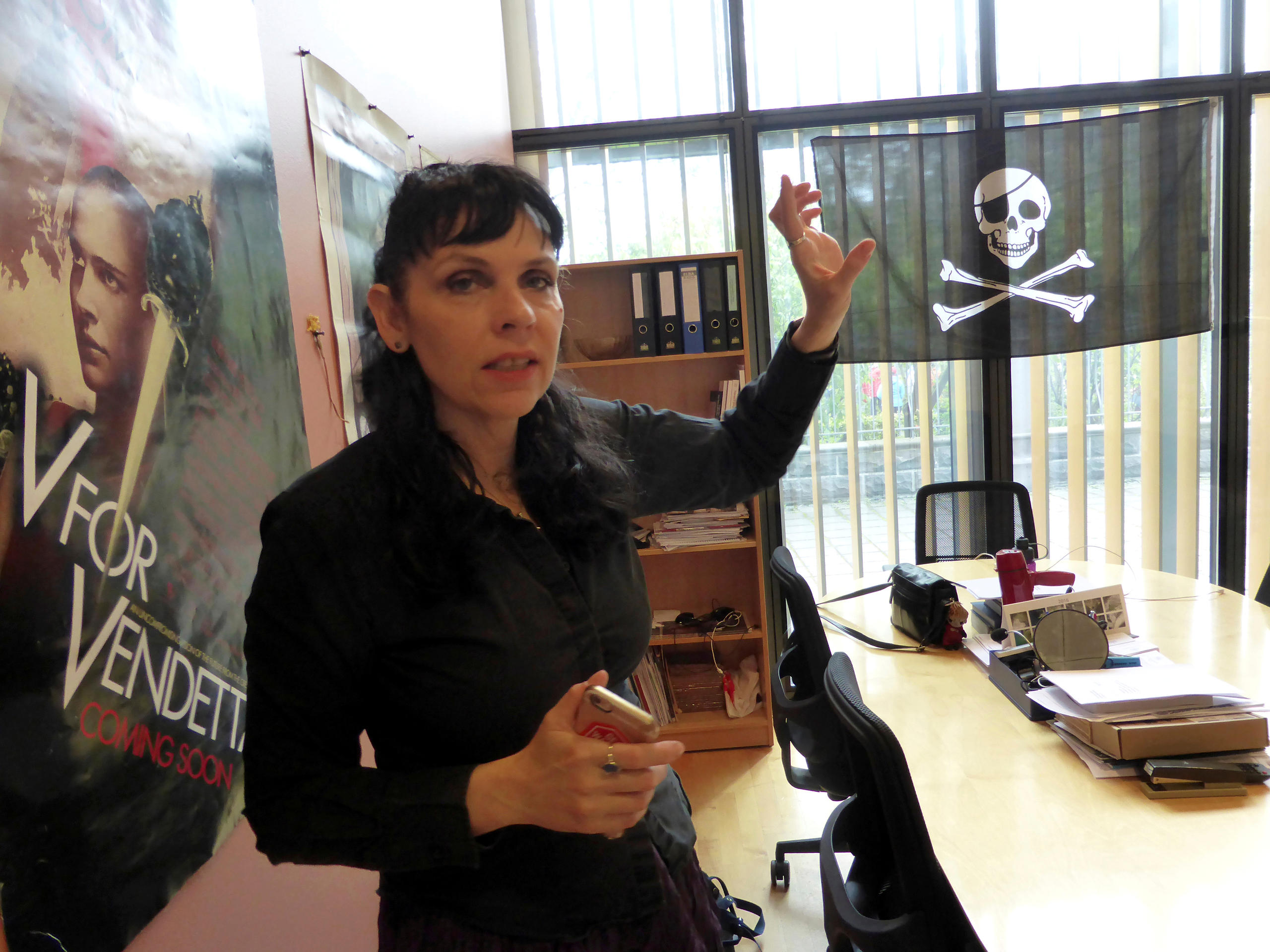‘We need more artists and philosophers in politics’

Democracy must become much more diverse and involve greater experimentation, says Birgitta Jónsdóttir, co-founder of the Icelandic Pirate Party, whose platform includes direct democracy and greater government transparency. The group could get its first taste of real power at the Icelandic parliamentary elections on October 29.
“I think it’s extremely important to get citizens involved. We should simply go out and ask people, ‘What do you think is important?’ Ultimately, it’s their passion that will bring that into action. That is how I see democracy for 2030 and beyond,” Jónsdóttir External linktold the audience at the Geneva Graduate Institute during a recent panel discussionExternal link looking at the future of democracy.
The Icelandic politician, poet, activist and co-founder of the Pirate Party, could soon be tasting power. Iceland’s current government was forced to promise an early election after Prime Minister Sigmundur David Gunnlaugsson resigned amid a scandal over his wife’s offshore accounts, which were revealed in the Panama Papers.
Public outrage over alleged cronyism in Icelandic politics and the supposed impunity of the country’s wealthy few, has meant growing support for the Pirate Party, which calls for change and transparency. An MMR poll published on September 22 shows the Pirate Party and the conservative Independence Party with equal support (22.7%).
“We have elections in Iceland in a few weeks but nobody knows what will happen. The established parties are falling apart and nobody can believe it,” Jónsdóttir says.
Crisis is democracy’s best friend

The 49-year-old activist is fascinated by the idea of democracy – the rule of the people.
“After I became a politician, I promised to open the windows of parliament so people can see how it really works,” she says. “Before the big juicy crisis in Iceland in 2008, no one believed we could change anything. However, crisis is the best friend of democracy if you are prepared and you get people to ask for more rights. And that’s what happened in Iceland.”
Her party says citizens have an “unlimited right” to be involved in the political decisions that affect them, with ordinary voters able to propose new legislation and decide on it at the ballot box. It also wants no limit on individuals’ rights to express their views and share information, unless doing so violates others’ rights.
The party pushes new technologies to help promote civic engagement and government transparency and accountability.
“I really believe that it’s important to have citizens’ initiatives and the ability to call referendums to stop bad laws before they are passed and I believe we should have open governments,” she notes.
In this respect, Switzerland is a model – at least to a certain extent.
“Your long-term experimentation of transferring as much power as possible to citizens is something we are constantly citing. People in Iceland are very aware of it,” she explains. “You have been very successful but I think you need to evolve slightly. Your representative democratic structure, with many part-time politicians means you sometimes don’t get proper oversight.”
Birgitta Jónsdóttir took part in the recent panel discussion ‘Democracy 2030: Imagining the elections and parliaments of the future’, organised by the Geneva Graduate Institute and the Inter-parliamentary Union (IPU)External link, as part of canton Geneva’s Democracy Week.
The panel included Tunisian Member of Parliament, Myriam Boujbel, and Dutch Senator Nico Schrijver, Professor of Public International Law at Leiden University and a member of the IPU Executive Committee.
Experiments
Since the shock of the financial troubles of 2008, Icelanders have been experimenting with democracy in various ways. The new constitution was drawn up in 2011 through crowdsourcing and a national forum of 1,000 citizens randomly selected from the national registry. However, it currently remains on ice.
The capital city of Reykjavík has also launched a direct democracy platform, allowing anyone to put forward and discuss ideas to improve their city. The local council takes the top 10-15 ideas, which are processed and voted upon every month.
The Pirate Party is also a firm believer in giving citizens a direct influence on decision-making.
“We need to experiment. We have been doing so over and over and there is a big disconnect between public and elected representatives. Democracy is you, the system is you. I really want to find ways to engage the general public and get citizens’ initiatives taken in,” says Jónsdóttir. “We created something called ‘Better Iceland’- Anyone can put forward an idea, and if 2% of Icelanders support it, we will take it into parliament. If 10% support it we have to create a bill and put in a referendum.”
Despite all this, she says she envies young democracies like Tunisia, where it is ‘more exciting learning by trial and error’.
“It’s much harder when you come from a more established democracy to make fundamental changes. In Iceland right now we are kind of in between, but we cannot do it without the wisdom of the general public to guide us,” she adds.
Unlike parties in many other western democracies, one problem the Icelandic Pirate Party does not suffer from is attracting young supporters.
“I’m one of the oldest. I’m amazed to facilitate the platform where young people feel inspired to get involved. But we need more diversity in politics. We need more artists and creative people and philosophers,” she adds.
Having direct democracy instruments and appealing to youngsters is not enough though. The wider public has to be inspired to take part, she explains.
“Democracy is hard work. If people don’t participate and put all the responsibility on a small handful of people and think they can work miracles, they will always be disappointed,” she declares.

In compliance with the JTI standards
More: SWI swissinfo.ch certified by the Journalism Trust Initiative



You can find an overview of ongoing debates with our journalists here. Please join us!
If you want to start a conversation about a topic raised in this article or want to report factual errors, email us at english@swissinfo.ch.